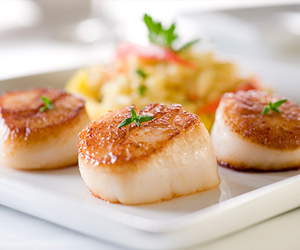
Scallops seem to be an enigma of the fish world with some people not realizing the scallop is actually a form of shellfish. In fact, typing ‘scallop’ into Google shows that people often ask if scallops are vegan. A quick reminder of what a scallop shell looks like will often lead to a forehead slap.
Indeed, the white, round, fleshy delicacy is the bivalve mollusk that opens and closes the beautifully ridged shells. In the United States, the most common kinds of scallops are the Atlantic deep sea scallop and the bay scallop. Though they are often labeled as such, you can also tell by size with the sea scallop measuring about one and a half inches in diameter and the bay scallop being much smaller at about a half inch wide.
Scallops make a wise choice for gastric sleeve, gastric bypass, and lap band patients for several reasons. They are low in calories and high in protein, which helps aid weight loss. A 2 oz portion of scallops provides 60 calories and 12 grams of protein along with 3 grams of carbohydrates and about 1 gram of healthy fat. That same 2 oz portion of scallops also provides about half the Daily Value of vitamin B-12.
Because of their small size, it is easy to control your portions with scallops, which is ideal for gastric sleeve, gastric bypass, and gastric band patients. It is easy to cook only a few for a dinner for one, or if cooking dinner for a group it’s easy to take just enough scallops to fill your smaller stomach without taking too many.
Consuming seafood has many benefits that do not only pertain to bariatric patients. Eating fish one to three times a month can reduce the risk of ischemic stroke by nearly 10%. That number increases with the frequency of eating fish. Consuming fish, especially fish high in omega 3 fatty acids like scallops, reduces the risk of coronary artery disease. Scallops in particular are an excellent source of B12, and a good source of magnesium and potassium, which all have heart healthy benefits. Another benefit to scallops is they are low in mercury, so you can eat them frequently without worrying about mercury poisoning.
Scallops are very perishable, so care should be taken when buying them fresh. You will often find fresh scallops shelled, washed, and either frozen or packed on ice. They can also be purchased frozen from the grocery store or warehouse store. Scallops cook quickly, just a few minutes on each side and they’re done. If your scallops are frozen, they will need to be defrosted before cooking to avoid overcooking. To defrost frozen scallops, place in a covered bowl the refrigerator for 24 hours or thaw under cold running water.
Cooking scallops can be super quick, depending on your recipe. They can easily be pan seared, baked, broiled, or grilled. Because they have a mild flavor, the ingredients you add will be important. Sauteing scallops with garlic is always a hit, or try them with lime and cilantro, or grill on a skewer with peppers, pineapple, mushrooms, and a cherry tomato. Your flavor options are wide open thanks to the naturally mild sweetness of scallops.
The above Food Highlight is offered by Dr. Shillingford, M.D., P.A., a board certified surgeon specializing in advanced laparoscopic and bariatric surgery. Dr. Shillingford’s gastric sleeve, lap band, and gastric bypass patients come to his Boca Raton office from both South Florida and Northern Florida, as well as Georgia, Texas, Ohio, New York, New Jersey, and Michigan. His weight loss surgery patients are often looking to explore new and different foods, and for many patients scallops may be a new food. Since scallops are low in calories, high in protein, taste good, cook quickly, are easy to portion control, and a heart healthy they can make a great addition to a bariatric weight loss diet.

 Am I A Candidate
Am I A Candidate  BMI Calculator
BMI Calculator  Why Choose Us
Why Choose Us